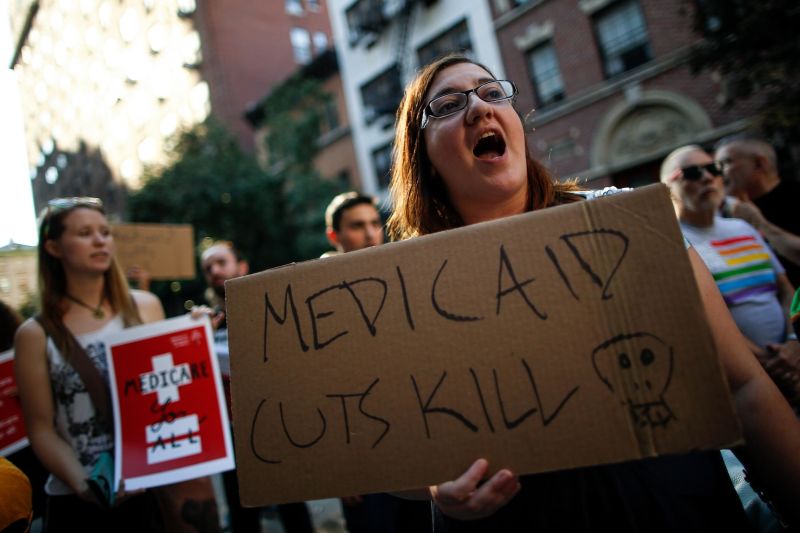Medicaid Cuts Fuel Internal Republican Conflict

Table of Contents
The Fiscal Hawks vs. The Compassionate Conservatives
The debate over Medicaid cuts pits two powerful factions within the Republican Party against each other: the fiscal hawks and the compassionate conservatives. This ideological clash highlights the tension between fiscal conservatism and social conservatism.
-
Fiscal Hawks: This group prioritizes reducing the national debt and controlling government spending. They argue that Medicaid is unsustainable in its current form and requires significant cuts to ensure fiscal responsibility. Their arguments often center around the long-term financial burden of the program and the need for market-based healthcare solutions. They advocate for measures like stricter eligibility requirements and reduced benefits.
-
Compassionate Conservatives: This faction emphasizes the importance of the social safety net and protecting vulnerable populations. They argue that Medicaid cuts would disproportionately harm low-income families, children, the elderly, and individuals with disabilities, leading to devastating consequences for their health and well-being. They advocate for finding alternative solutions to address budget concerns without sacrificing access to essential healthcare services.
-
Examples of proposed cuts include reducing the federal matching rate for Medicaid expansion, imposing stricter work requirements, and limiting eligibility for certain populations. These cuts could lead to millions losing coverage and facing significant financial hardship accessing healthcare.
-
Prominent Republican figures on both sides of this debate include senators and representatives who actively champion fiscal responsibility versus those advocating for preserving the social safety net. The internal struggle is clearly visible in public statements, legislative proposals, and internal party discussions.
The Political Ramifications of Medicaid Cuts
The political ramifications of Medicaid cuts are significant and far-reaching, posing a substantial risk for the Republican Party, particularly in upcoming elections.
-
Impact on Public Opinion: Public opinion polls consistently show strong support for Medicaid, particularly among key demographic groups. Medicaid cuts are therefore unpopular, potentially harming the Republican Party's image and electability, especially in swing states.
-
Voter Turnout: The issue of healthcare access is a potent motivator for voters. Medicaid cuts could significantly impact voter turnout, particularly among those who stand to lose coverage or face reduced benefits. This could negatively affect Republican prospects in elections.
-
Electoral Consequences: The political fallout from supporting or opposing Medicaid cuts could be substantial. Republicans who vote for significant cuts risk alienating moderate voters, while those who oppose them might face criticism from more conservative elements within their party.
-
Recent polling data consistently indicates that support for Medicaid expansion and opposition to significant cuts is widespread, even among some Republican voters. This underscores the significant political risk associated with this issue.
The Role of Lobbying and Special Interest Groups
The debate surrounding Medicaid cuts is heavily influenced by powerful lobbying groups.
-
Key Players: Healthcare lobbyists, including pharmaceutical companies, hospital associations, and insurance providers, play a significant role in shaping the narrative surrounding Medicaid. Their financial contributions and lobbying efforts exert considerable pressure on policymakers.
-
Campaign Donations and Political Influence: Campaign donations from special interest groups can significantly influence the positions of elected officials. Groups opposing cuts may contribute more to candidates advocating for preserving Medicaid benefits.
-
Effectiveness of Lobbying Efforts: The effectiveness of lobbying efforts varies depending on the specific issue and the political climate. However, the influence of powerful lobbies is undeniable and significantly impacts the debate around Medicaid cuts.
Potential Alternatives and Compromises
Instead of drastic cuts, there are alternative approaches that could address fiscal concerns while preserving access to healthcare.
-
Medicaid Reform: Rather than simply cutting benefits, reforming the Medicaid system to improve efficiency and reduce costs could be a more effective approach. This could involve implementing better cost-containment measures, streamlining administrative processes, and promoting preventative care.
-
Block Grants: Converting the current Medicaid system to a block grant system could offer states greater flexibility in managing their Medicaid programs. However, this approach also carries risks, as it could lead to reduced funding and benefits in some states.
-
Bipartisan Solutions: Finding common ground and working across party lines is crucial to crafting solutions that address fiscal concerns without jeopardizing access to healthcare. Bipartisan cooperation could lead to more sustainable and effective reforms.
-
Successful reforms in other states demonstrate the possibility of finding creative solutions that balance budget concerns with the need to provide essential healthcare services to vulnerable populations.
Conclusion
The internal Republican conflict over Medicaid cuts highlights a critical clash of ideologies within the party – between fiscal conservatism and social compassion. The potential political repercussions are significant, with the debate impacting public opinion, voter turnout, and the electoral prospects of the party. The influence of lobbying groups further complicates the issue. However, exploring alternative approaches such as Medicaid reform, block grants, and bipartisan collaboration could lead to more sustainable and equitable solutions. Stay informed about the ongoing debate surrounding Medicaid cuts and their impact on the American healthcare system. Contact your representatives to voice your concerns and advocate for solutions that balance fiscal responsibility with access to healthcare for all. Demand effective Medicaid reform, explore options for Medicaid expansion where needed, and ensure adequate Medicaid funding to protect the vulnerable.

Featured Posts
-
 The Switzerland Trail A Journey Through Boulder Countys Mining History
May 18, 2025
The Switzerland Trail A Journey Through Boulder Countys Mining History
May 18, 2025 -
 Dodgers Defeat Mariners As Michael Conforto Extends Strong Performance
May 18, 2025
Dodgers Defeat Mariners As Michael Conforto Extends Strong Performance
May 18, 2025 -
 13 Year Prison Sentence For Australian Fighting For Ukraine In Russia
May 18, 2025
13 Year Prison Sentence For Australian Fighting For Ukraine In Russia
May 18, 2025 -
 This Weeks New Music Ezra Furman Billy Nomates And Damiano David
May 18, 2025
This Weeks New Music Ezra Furman Billy Nomates And Damiano David
May 18, 2025 -
 Re Ranking Taylor Swifts Taylors Version Albums A Fans Perspective
May 18, 2025
Re Ranking Taylor Swifts Taylors Version Albums A Fans Perspective
May 18, 2025
Latest Posts
-
 Classmate Recalls Disturbing Incidents Involving Amanda Bynes At School
May 18, 2025
Classmate Recalls Disturbing Incidents Involving Amanda Bynes At School
May 18, 2025 -
 Is Amanda Bynes On Only Fans The Full Story
May 18, 2025
Is Amanda Bynes On Only Fans The Full Story
May 18, 2025 -
 Confortos Home Run Key To Dodgers 6 4 Victory Over Mariners
May 18, 2025
Confortos Home Run Key To Dodgers 6 4 Victory Over Mariners
May 18, 2025 -
 Amanda Bynes And Taran Killam A Look Back At Their Relationship
May 18, 2025
Amanda Bynes And Taran Killam A Look Back At Their Relationship
May 18, 2025 -
 Amanda Bynes Former Classmate Details Troubling Past Behavior
May 18, 2025
Amanda Bynes Former Classmate Details Troubling Past Behavior
May 18, 2025
